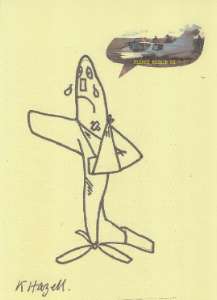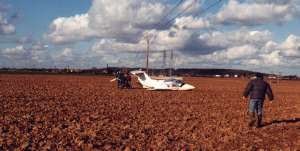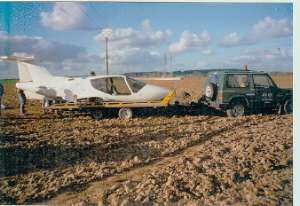|
The
Crash

By
a beautiful morning of February 1999 we were , my son Patrick and myself,
flying over the Normandy countryside around Mézidon when we felt a light vibration
(a little like carburetor icing, but my Lycoming is injected), by the time I
changed tank, checked magnetos, a stronger vibration came on and the engine
stopped…we were gliding. We could hear the propeller turning in the back. At
1500
feet , I just had time to
send a mayday to give our position and to say that we were making an
emergency landing in a field; meanwhile it was necessary to manage the situation:
ploughed fields (that was the only option) not too far from homes (easier to get
help), high tension wires which I will have to knit, find the good slope, get
the landing gear down so that, if it goes, most of the energy will be burned
off before we stop, cut off fuel and contacts and of course, fly the plane until
the end. The landing will be shortest of my career (
50
meters) but it leaves us
completely unscathed, which is not the case of the left wing, it looks badly
ruffled.

Two immediate observations, Patrick’s
sang-froid surprised me very much and I was pleased, the composite structure
resisted the shock extremely well (except the wing, all seemed in good
condition, one would think that the plane had just made a belly landing).
The
following
day, after searching for a trailer, a driver and man power (thank you very
much buddies), when we came to get the wreck off the field, we discovered that
the driveshaft had broken approximately 30 cms away from the aft bearing cage.

We had to saw the wings off
to get the wreck on the trailer and we returned to the hangar by road.
There I really thought that the
Orion’s adventure was finished for us. There was nothing left but to dismantle
everything and try to resell the parts, the engine and the instruments!!!
Then after some days of decanting, we
made the following observation: except the wing, everything was still good, therefore either we made or found a new
wing !!
We
were far from believing that the few months we thought necessary to rebuild
would turn out to be 5 years (when one loves, one does not count!)

What
happened?
After examination, the accident’s origin was as follows: a few months earlier, I had
the good idea to have the driveshaft checked in a specialized shop for Glaenzer Spicer.
When I got the driveshaft back, it was very beautiful and had been repainted.
But what I had not noticed right away was that the original fly-weights
had been ground, and wildly at that, then new runners had been welded
but un-correctly or at least they had not been checked and thus - by metal
fatigue- one weld started a crack that propagated around the shaft for finally
breaking when the shaft came in contact with the inside of the fuselage.
Findings after this crash :
I had heard some horendous stories on
the Orion’s formula and these “stories” were hawked by good souls in the
aviation’s world and I continue to hear them from time to time,
namely:
ü
The driveshaft caused vibrations.
ü
In the event of engine stoppage, the
propeller would turn wildly, making a disc brake which would make the plane
un-controllable.
ü
In the event of a crash , the shock
would force the engine to penetrate in the cockpit crushing its occupants.
ü
The Orion was hard to pilot because
unstable.
Well if
this event did not cause more vibrations than what I described,
then,:
· The driveshaft doesn’t
vibrate. When I was an ALAT pilot
(Aviation of the Army) in Algeria, I had engine vibrations
once and I can guarantee that I could not read
the instruments, and that
was vibrations!!
· We
were hearing the propeller very well, but never did we feel brutal
braking
nor did I have any difficulties controlling the
airplane.
· Neither did the engine nor the bulkhead
move forward during the crash and thank’s God.
· The Orion is a pleasure to
fly and if it did not glide for a very long time it is only because
1500 feet does not leave you with many options, and, of course,
I wish good luck to those who did not have this opportunity yet; but
undoubtedly, they will fare much
better.
Top of
Page
| 

